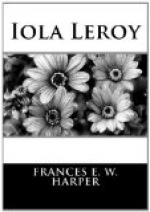“I think,” said Professor Gradnor, “that what our country needs is truth more than flattery. I do not think that our moral life keeps pace with our mental development and material progress. I know of no civilized country on the globe, Catholic, Protestant, or Mohammedan, where life is less secure than it is in the South. Nearly eighteen hundred years ago the life of a Roman citizen in Palestine was in danger from mob violence. That pagan government threw around him a wall of living clay, consisting of four hundred and seventy men, when more than forty Jews had bound themselves with an oath that they would neither eat nor drink until they had taken the life of the Apostle Paul. Does not true patriotism demand that citizenship should be as much protected in Christian America as it was in heathen Rome?”
“I would have our people,” said Miss Delany, “more interested in politics. Instead of forgetting the past, I would have them hold in everlasting remembrance our great deliverance. Hitherto we have never had a country with tender, precious memories to fill our eyes with tears, or glad reminiscences to thrill our hearts with pride and joy. We have been aliens and outcasts in the land of our birth. But I want my pupils to do all in their power to make this country worthy of their deepest devotion and loftiest patriotism. I want them to feel that its glory is their glory, its dishonor their shame.”
“Our esteemed friend, Mrs. Watson,” said Iola, “sends regrets that she cannot come, but has kindly favored us with a poem, called the “Rallying Cry.” In her letter she says that, although she is no longer young, she feels that in the conflict for the right there’s room for young as well as old. She hopes that we will here unite the enthusiasm of youth with the experience of age, and that we will have a pleasant and profitable conference. Is it your pleasure that the poem be read at this stage of our proceedings, or later on?”
“Let us have it now,” answered Harry, “and I move that Miss Delany be chosen to lend to the poem the charm of her voice.”
“I second the motion,” said Iola, smiling, and handing the poem to Miss Delany.
Miss Delany took the poem and read it with fine effect. The spirit of the poem had entered her soul.
A RALLYING CRY.
Oh, children of the tropics,
Amid our pain and wrong
Have you no other mission
Than music, dance, and song?
When through the weary ages
Our dripping tears still fall,
Is this a time to dally
With pleasure’s silken thrall?
Go, muffle all your viols;
As heroes learn to stand,
With faith in God’s great justice
Nerve every heart and hand.
Dream not of ease nor pleasure,
Nor honor, wealth, nor fame,
Till from the dust you’ve lifted
Our long-dishonored name;
And crowned that name with glory
By deeds of holy worth,
To shine with light emblazoned,
The noblest name on earth.




